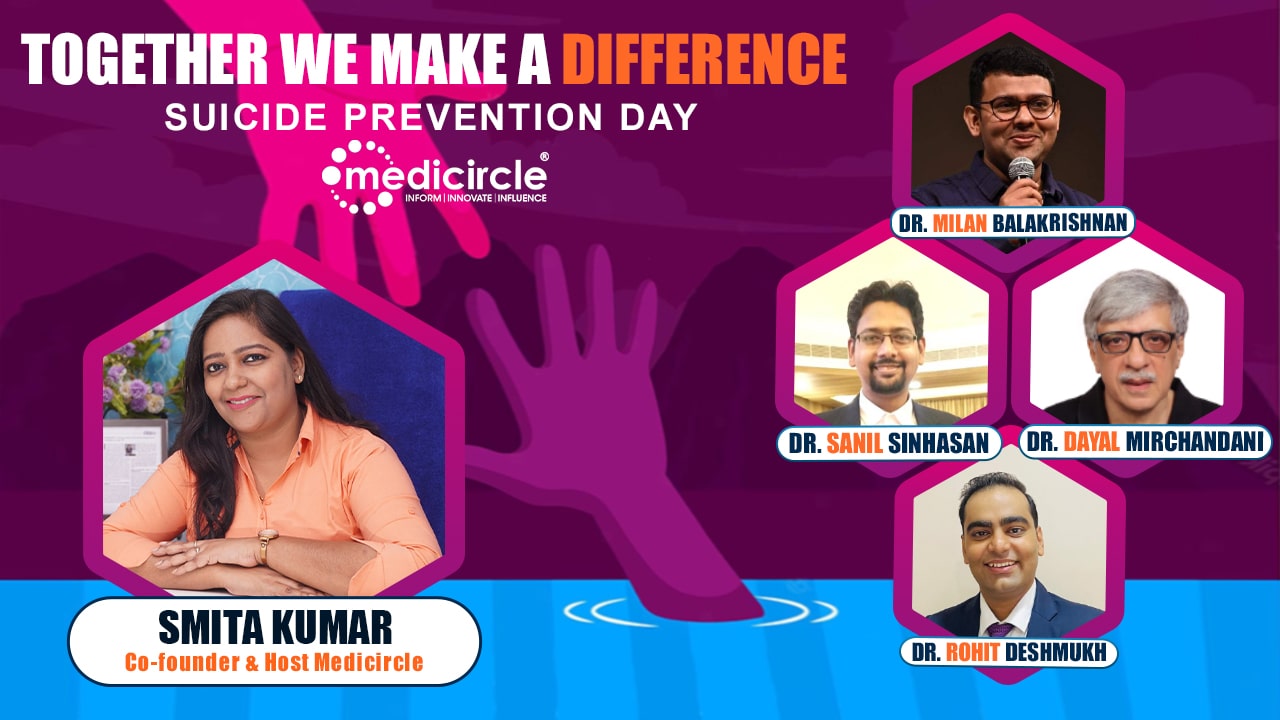On World Suicide Prevention Day, Medicircle conducted a seminar to shed light on the pressing issue of mental health problems, especially among students. Recent reports show that over the past seven months, at least 20 cases of suicide have been reported among students in central education institutions.
In this webinar, experts in the field of mental health came together to share their knowledge and experiences. They discussed various aspects of mental health, including how to express emotions effectively and improve the mental well-being of students and their families.
1.Dr. Dayal Mirchandani [Psychiatrist] highlighted the need to protect children from early stress and carefully consider sending them to high-pressure environments like Kota. He emphasized encouraging open communication with children, not relying on superstition but medical treatment, and consulting qualified mental health experts, especially psychiatrists, for severe mental health issues.
2.Dr. Rohit Deshmukh [Neuropsychiatrist/Sychotherapist] expressed that the ease with which children embrace competition, especially in high-stress environments like Kota, is the key. The influence of movies, such as "3 Idiots," can create unrealistic expectations. Children need to understand their capabilities early and whether they are suited for such competitive environments as Kota or cracking the IIT exam. Not everyone can be a winner, and various career paths can lead to success. Parents should also provide guidance and not limit their children's options to just becoming doctors or engineers. Pressure in Kota often doesn't lead to success, and children must explore diverse career options.
3.Dr. Milan Balakrishnan [Psychiatrist] emphasized the importance of recognizing critical warning signs for suicide, such as discussing death, sudden gift-giving, clearing debts, engaging in unusual activities on social media, and showing signs of depression. Symptoms of depression such as reduced communication, isolation, avoiding meeting others, and changes in behaviour like anger, irritability, restlessness, and prolonged periods of wakefulness are early signs of anxiety. These signs are serious indicators that require immediate attention and intervention.
4. Dr. Sanil Sinhasan [Psychiatrist] underlined the vital role of schools and teachers during students’ formative years, particularly in adolescence when emotional stress is prevalent. Teachers need knowledge of early depression signs to identify and guide students to mental health experts. Students should receive mental health education, and schools should partner with experts for emergency support. National helpline numbers should be promoted and extracurricular activities should be encouraged. To address stress from bullying, suggestion boxes should be mandatory. Teachers should foster an open environment for students to share their concerns.
In conclusion, the Medicircle webinar on Suicide Prevention Day brought attention to the importance of addressing mental health concerns, particularly among students. It emphasized the need for early intervention, open discussions, and a supportive environment in schools and homes. By working together to raise awareness and remove the stigma around mental health, we can strive to prevent tragic cases of suicide and promote a healthier society

 Recent reports show that over the past seven months, at least 20 cases of suicide have been reported among students in central education institutions.
Recent reports show that over the past seven months, at least 20 cases of suicide have been reported among students in central education institutions.







.jpeg)
.jpeg)
.jpeg)
.jpeg)
_(1)_(1)_(1).jpeg)
.jpeg)

_(1).jpeg)





.jpeg)


.jpeg)
.jpeg)






.jpeg)
.jpeg)